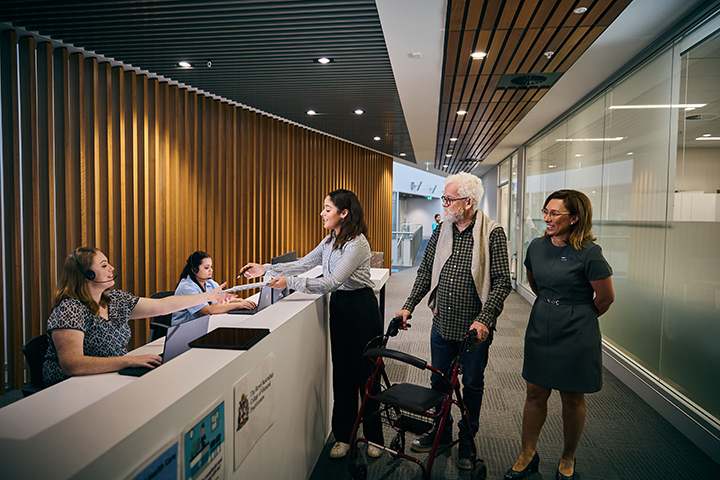A receptionist is key in any business, being the first face people see. They show what the company is like through how they talk and act. Their job includes answering phones, welcoming guests, and solving questions quickly.
In Australia, the need for receptionists is steady in many fields like healthcare and hotels. They are great at handling many tasks at once and keeping things calm. This makes them essential for smooth business running.
Understanding the Role of a Receptionist
The role of a receptionist is crucial for a smooth experience for everyone. They are the first face people see, making a big impact. Receptionists handle many tasks to keep the company running smoothly.
Key Responsibilities of a Receptionist
Receptionists manage appointments and schedules, and offer administrative help. They connect different departments, helping the business work better. They welcome guests, answer phones, and guide inquiries to the right people.
Good customer service is key. How a receptionist greets visitors can shape their whole experience.
Importance of First Impressions
First impressions are everything for a receptionist. A friendly and professional welcome can make a great impression. In fact, 86% of customers are willing to pay more for a better experience.
When a receptionist is welcoming and engaging, they do more than just help visitors. They show what the company stands for.
Skills Essential for a Successful Receptionist
Receptionists are key in any organisation. Their success depends on many skills. Being good at communication is crucial. They often meet clients and guests first.
They need to talk clearly and listen well. This makes their work professional and quick. They also need to be organised. This means handling many tasks and keeping records neat.
Knowing how to use technology is also important. This includes software that makes their job easier. Here’s a look at these important skills.
Communication Skills
Receptionists must be great at talking and writing. They talk to many people, so being clear is key. They should know how to use phones and emails well.
Being empathetic and a good listener helps too. It makes customers happy and builds trust.
Organisational Skills
Receptionists need to keep things running smoothly. They book appointments and update records. They must also sort tasks by priority.
This keeps the office running well. A well-organised receptionist makes everyone more productive.
Technology Proficiency
Today’s receptionists need to know about technology. This includes office software and CRM tools. Knowing about cloud apps is also important.
This knowledge helps them work faster and better. A tech-savvy receptionist can make things more efficient.
| Skill Type | Description | Importance in Role |
|---|---|---|
| Communication Skills | Articulation and clarity in verbal and written communication | Critical for effective interaction with clients |
| Organisational Skills | Managing schedules and maintaining orderly records | Enhances overall office productivity |
| Technology Proficiency | Familiarity with various software and CRM tools | Essential for efficiency and service quality |
The Receptionist’s Contribution to Company Culture
Receptionists do more than just administrative tasks. They play a big role in shaping the company culture. They impact the reception environment and teamwork in business. As the first point of contact, they set the tone with their interactions and attitude.
Creating a Welcoming Environment
A welcoming reception environment is key to a good company image. Receptionists greet guests warmly and professionally. This makes visitors feel at home and valued.
This first impression can make a big difference. It shows the company’s values and commitment to its customers. By making visitors feel appreciated, receptionists help create a positive atmosphere in the company.
Facilitating Team Collaboration
Teamwork is vital for success in business. Receptionists help by managing communications between departments. They act as a link, sharing information and setting up meetings.
Receptionists work to break down barriers between teams. This promotes a culture of cooperation and shared goals. Their efforts improve productivity and strengthen employee relationships.
| Receptionist’s Role | Impact on Company Culture | Benefit to Teamwork |
|---|---|---|
| Welcoming Visitors | Enhances the reception environment | Encourages a sense of belonging |
| Managing Communications | Promotes open dialogue | Facilitates collaboration |
| Supporting Team Initiatives | Strengthens company values | Builds cohesive teams |
Receptionist Duties in Different Industries
Receptionists have different roles in various industries. Each job needs special skills and knowledge. Knowing what healthcare, corporate, and hospitality receptionists do shows how important and versatile this job is.
Each field has its own way of working. Receptionists must adapt to help their teams and clients well.
Healthcare Receptionists
In healthcare, receptionists do more than just sit at a desk. They manage appointments and keep patient info safe. They also help patients find their way and answer questions about medical services.
Corporate Receptionists
Corporate receptionists handle a lot of tasks. They set up meetings, order supplies, and talk to different teams. They help executives and make the office run smoothly. Being organised is key to their job.
Hospitality Receptionists
Hospitality receptionists focus on great customer service. They book rooms, check guests in and out, and solve problems. They need to be friendly and quick to make guests happy. Their work helps hotels and resorts get good reviews.
Challenges Faced by Receptionists
Receptionists face many challenges that affect their role in the organisation. They often deal with high-pressure situations, especially during busy times. Keeping calm and handling many tasks at once is key, especially in places like hospitals where time is critical.
Managing High-Pressure Situations
In fast-paced settings, receptionists need to think fast and make good decisions. They handle lots of calls, meetings, and unexpected issues all at once. Learning to manage stress and organise tasks well helps them stay focused and keep customer service high.
Handling Difficult Customers
Dealing with tough customers is another big challenge. Receptionists must solve problems while staying professional. They need strong skills to handle complaints and make sure everyone leaves happy. Training in customer service and emotional intelligence helps them handle these situations better.
| Challenge | Impact on Receptionist | Solutions |
|---|---|---|
| Managing High-Pressure Situations | Increased stress levels, potential burnout | Effective stress management strategies, prioritisation training |
| Handling Difficult Customers | Emotional fatigue, decreased job satisfaction | Conflict resolution training, improved communication skills |
Conclusion
Receptionists do more than just answer phones or book appointments. They create a welcoming space that makes a great first impression. This shapes the customer’s experience. They also show what a company stands for, connecting it with its clients.
Receptionists face tough challenges, like dealing with stress and difficult people. They need great communication and organisational skills. These skills are key to their role in keeping things running smoothly.
As companies see how important receptionists are, they should invest in their growth. This makes them even more valuable. In today’s fast-changing world, receptionists play a key role in both internal and external interactions.


